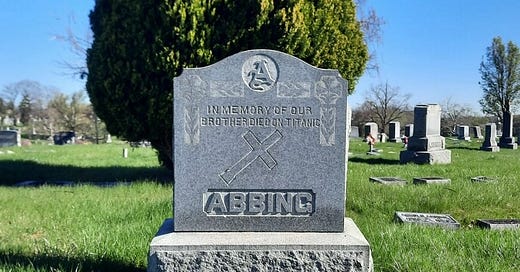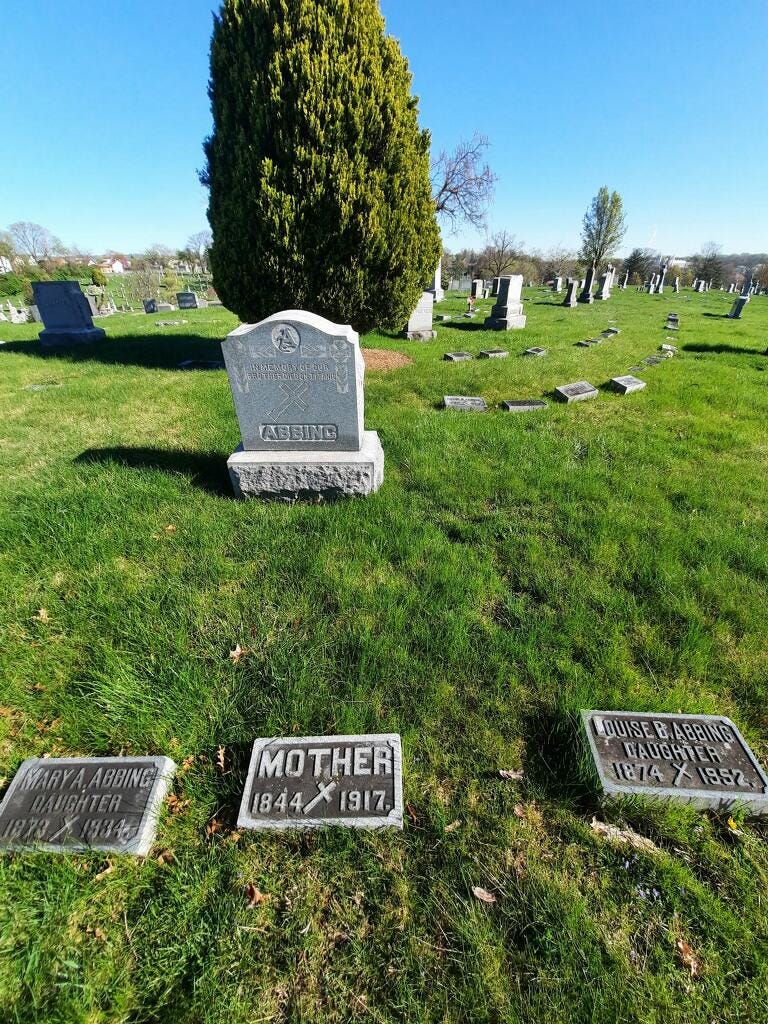Finding your local Titanic history
A tribute to Cincinnati's Anthony Abbing and the family who mourned him
Today I’m excited to feature the first contributed post to the Silent Sod! This piece is from my sister, Charlotte Zureick, who’s involved in the Titanic history community. In honor of the anniversary of the sinking coming up on April 15th, I asked Char if she could document how she’s paid tribute to a Titanic victim local to Cincinnati and to share resources so readers can do the same in their areas.
“And to think,” cried the mother of Titanic third class passenger Anthony Abbing of Cincinnati, Ohio, “of the anticipation that we held for my boy’s home-coming. He wrote to us often and he said he was coming back to me because I was getting old and needed his protection.”
It was May 24, 1912. Over a month earlier, on her maiden voyage, the great ocean liner Titanic had sunk to the bottom of the Atlantic on the night of April 14th going into the early morning of April 15th, 1912.
Forty-two year old Anthony Abbing, a native of Cincinnati, Ohio, had been working in South Africa for several years before booking his travel home on that ill fated voyage.
In June of 1896, Abbing was described as a heavyweight wrestler, a practical workman, and a blacksmith. He had decided with two other athlete friends to go to Johannesburg, South Africa, tempted by the stories of riches.
Abbing’s family had not known he was on the Titanic as he had stated in a letter that he was going to wait to cross the ocean until the steamship Philadelphia sailed. When several weeks went by with no news from him while at the same time receiving a concerned cablegram from his employer in South Africa, the family began to have their suspicions. Finally, a letter was written by one of his brothers to the White Star Line in New York asking if he was on the Titanic. A response came, “Anthony Abbing, 42, was one of the passengers.”
And now with this news and a fruitless trip by his brother to New York with a glimmer of hope for news that perhaps Abbing was saved on a lifeboat, his family knew that it was time to set aside hope for his homecoming and honor their beloved son and brother. His body was lost at sea as were many others in the disaster. A funeral service was held as if there was a coffin. And at a later time, his family erected a cenotaph to commemorate his life which reads, “In memory of our brother died on Titanic.”
April is the month where Titanic enthusiasts often attend events to commemorate the lives of the 1,496 who perished in the sinking. There are several held throughout the world both online and in person. There is a Facebook page, Titanic Current Events and Happenings, that specifically focuses on information about these events. Another great resource for finding memorials is to look at the TitanicMap created by researcher Gunter Babler that shows Titanic graves and memorials around the globe. Can you find a local individual commemorated near you on this map?
I found both of these resources through my involvement in the Titanic Book Club, whose mission is “honoring Titanic and her legacy through factual, documented history.” They regularly share events and resources for those interested in Titanic and her story in addition to featuring a different Titanic book for each month.
For this year’s Titanic anniversary month, I decided to make a personal visit to Abbing’s cenotaph at St. Mary’s cemetery in St. Bernard, Ohio and was touched to see his mother’s grave right in front of it along with his siblings.
The large size of his stone surrounded by the humble stones of his family speaks to the great impact this sudden loss had to have had on each of their lives. To me the site is comforting in that even though they experienced this unbelievable loss, they can now rest peacefully, eternally basking in his titanic memory.









I used the TitanicMap to find a local memorial near me in Northfield, Massachusetts for Annie Funk, a Mennonite missionary in India, who was coming home after six years to see her ailing mother. Interesting how her story is similar to Anthony Abbing. There's a Wikipedia entry about her: https://en.wikipedia.org/wiki/Annie_Funk
this makes you realize there are about 1500 stories from all the individuals who were lost. It would be an interesting book.